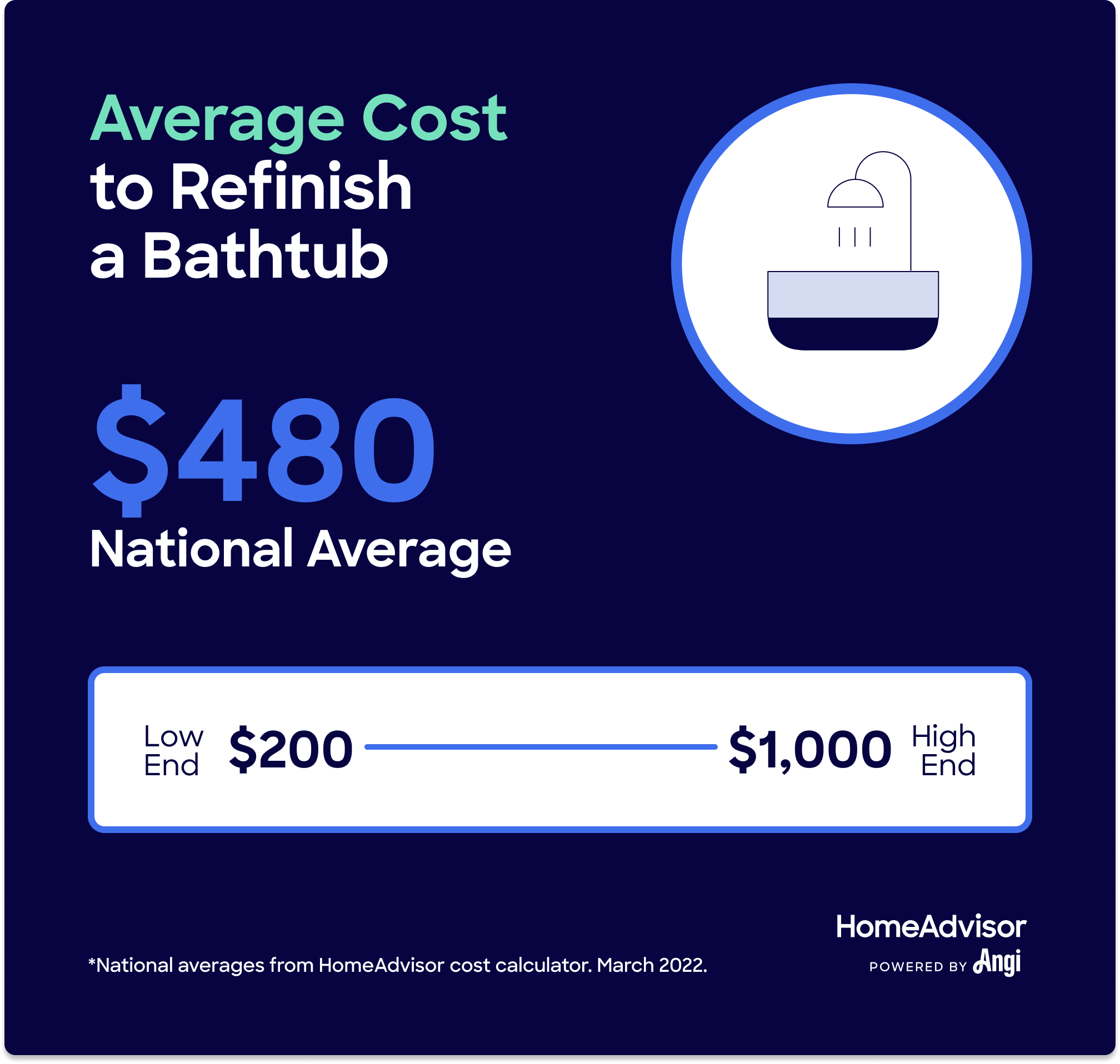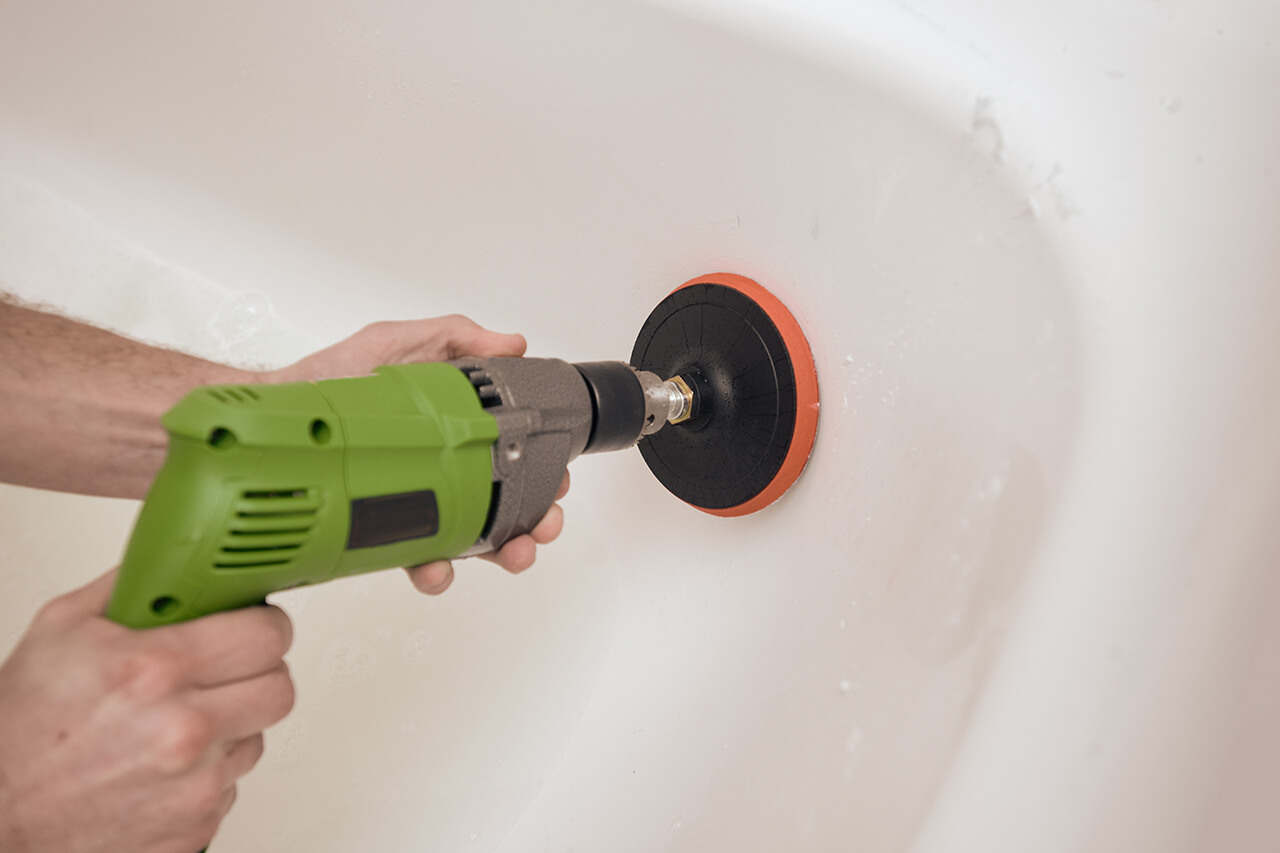How Much Does Bathtub Refinishing Cost?
Typical Range:
$335 - $628
Typical Range:
$335 - $628
Cost data is based on actual project costs as reported by 7,111 HomeAdvisor members. Embed this data
.
.
.
.
.
.
.
.
.
.
.
.
.
.
.
.
.
.
.
.
.
.
.
.
.
.
.
.
.
.
•
•
•
•
Updated June 1, 2022
Reviewed by Robert Tschudi, Expert Home Building and Remodeling Contributor.Bathtub refinishing costs $482 on average, with a typical range of $335 and $628. This includes $30 to $150 in materials and $200 to $500 in labor. Material and size can also affect the total.
Sometimes called "reglazing" or "resurfacing," this process gives your tub a fresh new look. It’s usually much less expensive than replacement, which means you can update your bathroom at a lower price.
2022 Notice: Material Prices Are Surging
Demand for remodeling and other building materials has grown over the past year. And as a result, manufacturers are increasing materials prices. Prices have gone up 5% to 10% this year, and many parts of the country are experiencing long delivery times. If you're planning a remodeling project, we recommend starting as early as possible in the season, preparing for potential price fluctuations, and allowing extra time to order materials.
Let's calculate cost data for you. Where are you located?
Where are you located?
| National Average | $482 |
| Typical Range | $335 - $628 |
| Low End - High End | $200 - $1,000 |
Cost data is based on actual project costs as reported by 7,111 HomeAdvisor members.
Bathtub resurfacing costs are dependent upon your tub’s material. Discover what you can expect to pay for resurfacing based on material.
| Fiberglass | $300 - $1,000 |
| Porcelain | $350 - $600 |
| Cast Iron | $350 - $600 |
The price to refinish a fiberglass bathtub ranges from $300 to $1,000, depending on the size. If you have a one-piece combo with shower surround, you’ll pay more because it’s a larger area.
Although reglazing covers chips or minor cracks in porcelain or enamel, fiberglass may need additional work. Fiberglass shower repair costs up to $240 and may add an extra 24 hours to the project.
Reglazing a porcelain tub costs $475 on average. Most in this style have a cast iron or steel base with a thin layer of porcelain on top. You can tell by putting a magnet on it. If it sticks, you’ve got metal inside.
If you have a solid porcelain tub, it’s probably 100+ years old. In this case, you’ll want to hire a pro with experience handling antiques.
Refinishing a cast iron tub costs $350 to $600. This material usually has a surface layer of porcelain or enamel. If it chips or scratches, the metal may rust quickly.
Cast iron was the standard in bathtubs for decades until synthetic materials like fiberglass rose in popularity. Resurfacing and regular cleaning can keep this type in good condition for more than 100 years.
Most cast iron units have an enamel coating that can chip or crack. When you read about re-enameling a tub, most pros are talking about repainting it with enamel. This is a significantly less expensive alternative that takes much less time.
Painting enamel onto a bathtub costs $350 to $600. Much like reglazing, this process includes sanding the surface and applying paint in a color of your choice.
True enameling, however, is a pricier project. It requires all of the steps outlined below, which can total up to hundreds, or even thousands, of dollars.
Removing the tub and disconnecting attached plumbing
Transporting it to a company for treatment
Baking the new enamel using a kiln
Delivering and re-installing it
Resurfacing a clawfoot tub ranges from $500 to $1,200. If you need to refinish the outside as well as the inside, you’ll pay closer to $1,200.
Most clawfoot styles have a porcelain layer on the inside of the tub and exposed cast iron on the outside, which makes them a good candidate for reglazing. This investment can help you keep an antique in usable condition for another 10 to 15 years.
With an average price of $475, refinishing is usually the most budget-friendly choice. Your bathtub may be a good candidate for reglazing if:
It’s in good condition with minimal scratching.
You don’t need to change the plumbing.
You like the style.
It’s an antique you can’t easily replace.
If you’re not sure, ask a pro for an onsite consultation. They can inspect the tub and tell you if you need more than a surface treatment.
Installing a bathtub costs $3,400 on average, but ranges from $400, for the tub & installation, to over $13,000 for adding a high-end spa-type tub. Although the unit can run as low as $400, getting the old one out and putting in a new one adds to the total expense. You should consider replacing if:
The old tub is cracked or seriously damaged.
You don’t like the style.
You need to fix the pipes behind the wall.
Keep in mind that this project can reach $5,000 or more depending on your plans. For example, the cost to install or replace plumbing ranges from $400 to $1,900, which you’d need to pay in addition to a new tub.
The cost to install a bathtub liner ranges from $1,800 to $5,100. If you’re looking for a compromise between refinishing and replacement, a liner can be a good choice because it:
Doesn’t require you to remove the tub.
Takes less time to install, often done in one day.
Covers large scratches or cracks.
Comes in a variety of colors and styles.
Refinishing ceramic tile costs $1,100 in addition to the $475 average to do the tub. If the tiles in the shower surround are cracked, chipped, or dull, this can give them a new life. Many pros can do both jobs at once.
Refinishing a tub and shower costs $500 to $1,000. Most combination units made of fiberglass or acrylic have no separation between top and bottom. This means that if you want to resurface one part, you’ll have to do the whole thing at once.
In addition to tub material and tub type impacting final bathtub resurfacing cost, also consider the size of your tub, whether it’s been refinished before, and if traction is needed.
First, there’s the size of your tub. The larger your tub is, the more surface area professionals will have to sand and reglaze. Deeper, wider tubs may strike a larger bill than small tubs.
Another element that will influence how much it costs to reglaze a tub is whether it’s been refinished before. Previous glazing may require professionals to use additional products to create a smooth surface when refinishing, meaning a greater timeframe for the entire process.
Lastly, there’s whether you will need traction control. If you prefer your tub to have built-in traction, you can ask for an anti-slip coat during installation. This coat may prevent slipping while using your tub or shower, but it will come at an additional cost.
You can save about $300 to $400 if you DIY this project, but most homeowners would be better off hiring a pro. Many remodelers can create custom colors to match what you already have or provide a completely different, fresher look. When you’re ready to locate bathroom contractors near you, remember to:
Read reviews from previous customers.
Request an onsite estimate.
Get quotes from at least three companies.
If you decide to DIY, you’ll need to pay $30 to $150 for a refinishing kit. These usually include epoxy or resin that you paint onto the surface after sanding it. Some adhesives begin to dry within a few minutes, so you must apply them quickly. If you’re not used to working with them, you may want to hire a professional just to make sure it’s done correctly the first time.
Refinishing, reglazing, and resurfacing a bathtub describe essentially the same thing. Installing a liner is a different process.
Refinishing a bathtub may save you about $3,000 on the price of replacement. If you take good care of it, you can extend its lifespan by many years.
Reglazing a bathtub can last up to 15 years, depending on upkeep. You’ll get a better result if you clean it regularly with a non-abrasive cleanser.
Refinishing a bathtub only takes professionals about three to five hours. Reglazing, on the other hand, usually takes around 24 hours.
You may use your bathtub 48 to 72 hours after it’s refinished. There are some curing processes, however, that speed up the drying process, allowing you to safely use your tub within 24 hours. High humidity and cold weather can cause drying to take longer than usual.

